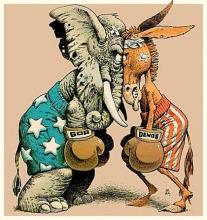Political Instability in Washington Manifests in New Challengers for 2012
Political Instability in Washington Manifests in New Challengers for 2012
It's true that presidential candidates hold undue sway in lobbying legislative debates in Washington. Michelle Bachmann, a Tea Party darling and denier of the possible U.S. default on Tuesday (she believes that Obama is "deceiving the American people") has been lobbying her fellow Republicans in the House to press for deeper cuts even if it means not passing a budget by the August 2nd deadline. Unfortunately, she's made this a part of her campaign stumping sermon across Iowa and given the baseless notion more public support than it actually deserves. C'est la vie, such is Washington. However, this is not the only way that campaign politics is intersecting with Washington politics. The dysfunction in Washington, despite or in addition to how it's fueled by GOP candidates' pandering, is spawning some unique challenges in the 2012 election cycle.
First is the entrance of Buddy Roemer, a moderate's Republican and someone that seems to be thoroughly sick of corporate and special interest's chokehold on Washington politics. (That would be the other kind of undue influence, outside of GOP stump speeches.) Roemer's entered relatively late, but on an attention-grabbing platform. Whereas most Republicans (all of the others, at this point) are running on a platform of social welfare for the wealthy, protection of corporate tax evasion, and the ubiquitous "limited government" mantra, Roemer wants to check corporate and special interest influence on the American political process. Where GOP are either Tea Party, or are attempting to appeal to Tea Party politics, Roemer has rejected the move and decided that what Americans really want is an end to bought-and-paid-for politicians (that would be republican and Democratic). In the interest of doing this he has launched a largely internet-based campaign, has stumped heavily already in New Hampshire and is now in Iowa, no doubt hoping for a fairly good showing in the upcoming Ames Straw Poll. The Straw Poll, which is an early indicator of Republican nomination likelihood, is likely to go to Michelle Bachmann at this point, but if Roemer can stay off the bottom it may be an indicator of his staying power among those that have been campaigning for months ahead of him. Look for Roemer to really start turning heads if his campaign can last into the GOP presidential debate season.
The other manifestation of public disgust for Washington in the 2012 election cycle is the entrance of the American Elects non-profit coalition, essentially promoting a third-party moderate ticket to balance the supposedly liberal Obama/Biden ticket (really about as moderate a Democratic showing as we've seen in decades) and the ultra-conservative GOP field. With such rigid political ideologies represented both on Capitol Hill and in the 2012 elections, it's no wonder that a group decided that now was ripe for a third-party insurgency. Americans Elect, funded (largely anonymously) by big-dollar donors to the tune of $20 million, has launched an internet campaign attempted at galvanizing a virtual grassroots campaign. A "virtual primary" allows anyone to become a "delegate" by logging on, choosing their preferred moderate ticket, and selecting campaign issues important to them. The ticket with the largest number of virtual votes will be adopted by the organization and campaigned across the country. Hey, why can't American citizens create made-to-order candidates? American corporations do.
What is most striking to me is that these candidates are breaking the mold not because their radical, and not because they're doing anything too incredibly different (with possible allowances for Americans Elect... that's pretty damn cool). They're breaking the mold primarily because they're moderate. Yes, the political process in Washington has become unpalatable to Americans because it's so infuriatingly partisan and ideological. The 2012 election is already shaping up to be one Republican sideshow after another while Obama, who has become a kind of unwarranted "antichrist" to the Tea Party and a sigh-inducing disappointment to liberals (some groups have already threatened to pull support), has lost the otherworldly shimmer he seemed to possess in 2008. Moderation, consensus, compromise; these concepts are as foreign to the 112th congress as a bloodless forfeit at a cock-fight. For that reason, it may be the most important development in the entire election cycle; something that may not influence the outcome, but will at least change the conversation. here's hoping.



